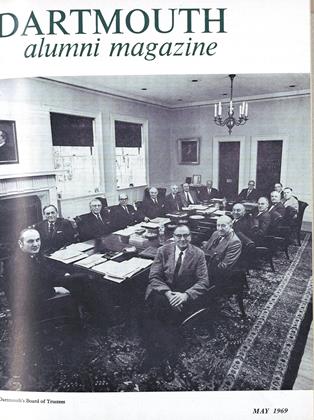Introduction by RichardEberhart '26. Garden City: Doubleday &Company Inc., 1969. 395 pp. $5.95.
The introduction is brief, 13 pages. For a page and a half Mr. Eberhart quotes verbatim Henry B. Williams, Dartmouth Professor of English and Director of the Experimental Theatre, about his production of Samson Agonistes; and, verbatim, for two pages Douglas Bush on Milton's puritanism and William Empson on Milton's Christian thinking. Mr. Eberhart summarizes Milton's life in three pages and the contents of paradise Lost and Samson Agonistes in two Four pages take care of Milton's present position, influences on other poets, reasons for not using rhyme, and the benefits of studying Milton today. As a student at Cambridge University Mr. Eberhart used to walk "from St. John's to Christ's partiallarly to touch the tree that had been touched by Milton."
This reprint of an earlier edition is without apparatus or notes of any kind. Apparently the publishers were convinced that with a major contemporary poet as genial guide, lovers of poetry ignorant of Milton and freed from a learned introduction and notes may be delighted to be led by the hand that loved to touch the tree touched by the hand of Milton. When, indeed, Mr. Eberhart reminisces or when he discusses the popularity and craftsmanship of his fellow artists, he can seldom fail to be interesting.
One is sobered, however, by the assumption in the introduction that twentieth-century readers are so ignorant of Milton they must be given the most elementary information drastically compressed. If the publishers had encouraged Mr. Eberhart to write a purely critical essay, this might have been an edition with something new to offer.
 View Full Issue
View Full Issue
More From This Issue
-
 Feature
FeatureMutual Sensitivity Wins the Day
May 1969 By JOHN DICKEY -
 Feature
FeatureWebster and the Court
May 1969 By THE HONORABLE EARL WARREN -
 Feature
FeatureWarner's 41 Dramatic Years
May 1969 By MARGARET BECK McCALLUM -
 Feature
FeatureMay 17 Event to Salute Eleazar's Starting Point
May 1969 -
 Books
BooksERNEST HEMINGWAY: A LIFE STORY
May 1969 By JEFFREY HART '51 -
 Article
ArticleThe Undergraduate Chair
May 1969 By CHRIS KERN '69
JOHN HURD '21
-
 Article
ArticleSIGHTED and SUNK
February 1951 By JOHN HURD '21 -
 Books
BooksA PASSPORT SECRETLY GREEN.
December 1961 By JOHN HURD '21 -
 Books
BooksPOLITICAL WRITERS OF THE EIGHT-EENTH-CENTURY.
MAY 1964 By JOHN HURD '21 -
 Books
BooksTHE BULLS AND THE BEARS: HOW THE STOCK EXCHANGE WORKS.
DECEMBER 1967 By JOHN HURD '21 -
 Books
BooksTHE VISIONARY UNIVERSE PROPHECY.
June 1974 By JOHN HURD '21 -
 Books
BooksJOHN BUTLER YEATS.
January 1975 By JOHN HURD '21
Books
-
 Books
BooksThe New England Quarterly
November 1936 -
 Books
BooksAN EXERCISE IN NOSTALGIA: MANTOLOKING 1880-1920.
MARCH 1971 By CHARLES E. MOREAU '21 -
 Books
BooksMan of Letters
OCTOBER, 1908 By Colette Gaudin -
 Books
BooksTHE MODERN CRITICAL SPECTRUM.
DECEMBER 1962 By F. CUDWORTH FLINT -
 Books
BooksSIDEWHEELER SAGA
July 1953 By HERBERT F. WEST '22 -
 Books
BooksEIGHTEENTH CENTURY STUDIES PRESENTED TO ARTHUR M. WILSON.
NOVEMBER 1972 By JOHN HURD '21

